Victorian Premier League: 1991–2013
The top level of competition in Victorian football, known as the State League since 1958, became the Victorian Premier League in 1991. It involved the leading clubs in the state in a conventional league season, and with the exception of the inaugural season in 1991, 1999 and 2000, was followed by a Finals series to determine the champion. Developments at national level, in particular the inception of the A-League, have benefited the state competition. Former National Soccer League clubs Melbourne Knights and South Melbourne rejoined the league in 2005, raising the level and helping to bring back many supporters.
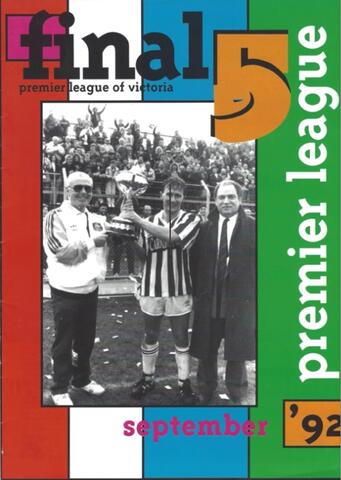
Promotion and relegation ensured that every club in Victoria could aspire to membership of the Victorian Premier League and new clubs often did well. Brunswick Juventus won the first edition of the Premier League, topping the table on goal difference ahead of Bulleen. There was no Finals series in the inaugural season, and Juventus thrashed Mooroolbark 6-1 in the final round, while Bulleen beat Northcote City 4-0. North Geelong won the first division of the State League in 1991, with Branko Culina at the helm, and went on to win the Premier League in 1992 after two excellent finals against Juventus. The grand final was locked at 1-1 at the end of normal time, but three goals in extra time saw them home. North Geelong’s team included Steve Horvat, the Cervinski brothers, Bogdan Bonk and Robbie Markovac.
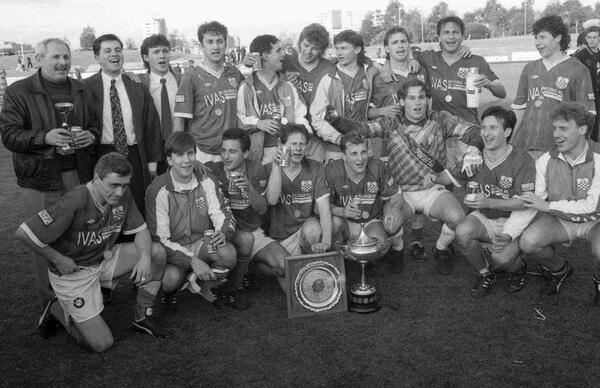
Bulleen topped the league in 1993, four points ahead of Fawkner, with North Geelong, Sunshine George Cross and St Albans making up the top five. The top two went all the way to the grand final, which was won by Bulleen 2-0. Adrian Pender was awarded the inaugural Jimmy Rooney Medal for the best player in the final, but it was Robbie Krajacic of Bulleen who lifted the trophy.
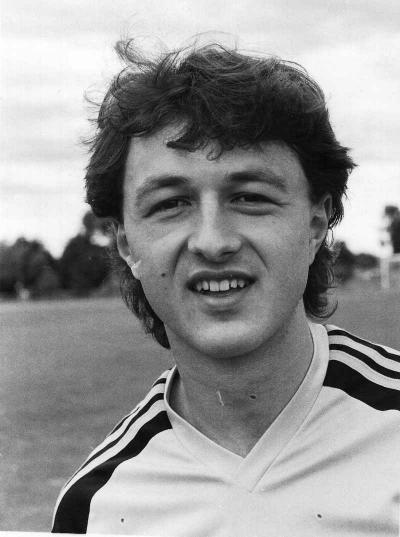
Port Melbourne Sharks emulated North Geelong in reaching the grand final in its first season in 1994 after being promoted along with champion Werribee City from division one of the State League. The Sharks survived two penalty shoot-outs against Bulleen to gain its place in the final, where Preston Lions proved too strong in a 3-1 win. Two goals to teenager Chris Sterjovski helped him to the Rooney Medal.
In 1995 Altona Magic and Bulleen played off in the grand final and drew 2-2 at the end of normal time. A magical intervention by Socceroo John Markovski in the first minute of extra-time, when he headed home a cross from Rooney medalist Chris Emsovski, proved to be the winner for the team from Paisley Park. The other scorers in a high quality final were Dale White with two goals for Bulleen and Ice Kutlesovski and Nick Georgopoulos for Altona.
The Magic won back-to-back titles in 1996 after an even closer finish in the grand final against Heidelberg United. After taking the minor premiership, Altona was favoured to win, but it was three-all at the end of normal and extra-time, and it took a penalty shoot-out to decide the title. Darren McGrath was the hero for the Magic, saving Brian McNichol’s spot-kick, while all five Magic players converted theirs. Henry Velkovski’s final penalty caused coach Gary Cole to lose his hair, since he had promised to have it shaved off if the midfielder scored the winning goal.
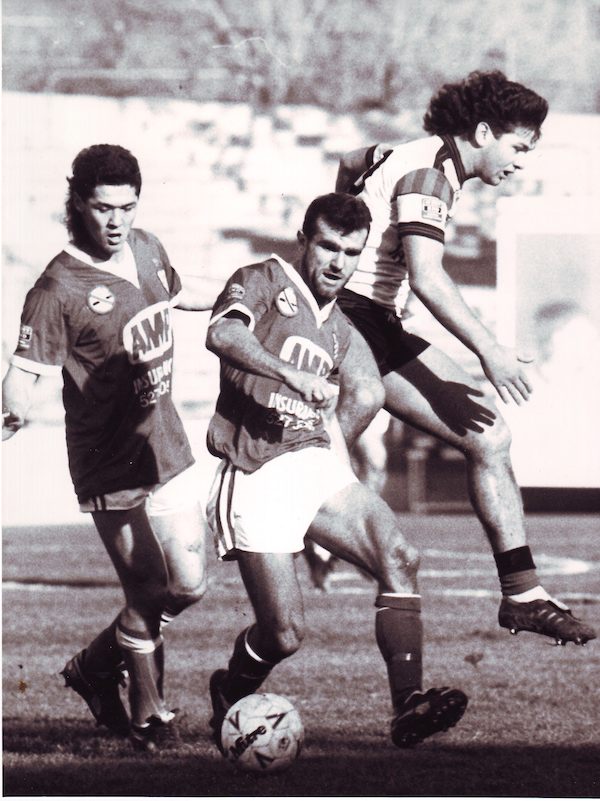
Bulleen Inter Kings were favoured to win the premiership in 1997, but once again the Magic had a surprise in store, with another narrow grand final win 4-2 after extra-time. Two goals to Damon Collina kept Bulleen on track, but Simon Micevski and Sash Becvinovski replied for the Magic, while Zdravko Atanasovski’s cross was deflected for an own goal and Becvinovski made the title secure in extra-time. Savva Rusmir picked up the Rooney Medal and Ian Dobson coached the Magic to its third win.
Bulleen made amends in 1998, defeating the minor premiers St Albans in a see-sawing final 3-2. Slavko Rados, complete with warpaint, won the Rooney Medal in a losing side, but Bulleen deserved its win when Michael Mazzini, who had scored a spectacular own goal earlier in the match, released Zdravko Atanasovski whose cross led to a simple tap in by Danny Gnjidic after two defenders had collided.
In 1999 and 2000 the Premier League reverted to a first-past-the-post league championship with no finals series. Green Gully Cavaliers had a comfortable 5-1 win over St Albans Saints in the last round in 1999 under Ian Dobson to secure its first Premier League title. Veteran striker Tony Neceski scored the final goal to round off a season in which he finished as Gully’s top scorer. The other scorers were George Svigos, Nick Papadopoulos, Zlatko Donev and Daniel Genovesi for Gully and Harry Karl for the Saints. Port Melbourne Sharks finished as runner-up and George Jolevski won the Gold Medal for the third year in a row.
Green Gully retained its title in 2000 despite losing its last match at home to runner-up Bentleigh Greens 3-0. Gully had led the league all season and only came under challenge from Bentleigh in the latter stages. Altona East Phoenix was third, followed by Bulleen and Preston. Zdravko Atanasovski completed an amazing run in which he won six successive Premier League championships with three different teams—Altona Magic in 1995, 1996 and 1997, Bulleen in 1998, and Green Gully in 1999 and 2000. That is a record which is never likely to be beaten. A naturally left-sided player, he was the ideal wing back and scored a number of critical goals for his teams.
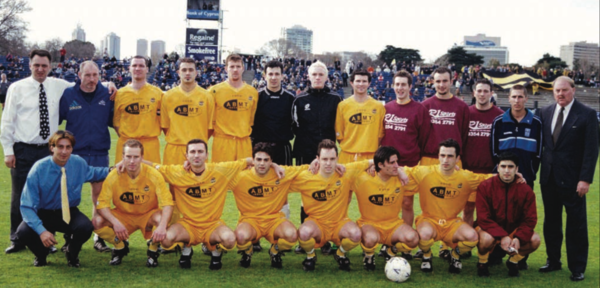
Heidelberg United, coached by Peter Ollerton, won the 2001 title after a penalty shoot-out victory over Port Melbourne in the grand final. There was some consolation for defeated coach Harry Chalkitis as he was chosen as coach of the year, having taken the Sharks from near relegation the previous season to the final. George Georgiadis and Mile Medjedovic gave the Bergers a 2-0 lead just short of the hour mark, but Peter Psarros and a Peter Tsolakis cross which was diverted past his own keeper by Cameron Brown saw the Sharks on terms in normal time. Brown made amends with the final penalty after Jim Kourtis had saved two kicks.
An epic grand final in 2002 saw Preston Lions defeat minor premiers Fawkner Blues 2-1. John Sapazovski nearly scored in the first minute in what turned out to be a Rooney Medal-winning performance. Two early injuries depleted the Lions, but Sapsazovski was on hand to tap in the opener after Robert Dolevski challenged Blues’ keeper Steven Tilovski. Ante Deak set up Frank Tramontana for Fawkner’s equaliser and the game went into extra-time when Nick Cuculevski spotted hesitation in the Blues’ defence to chip the winner.
Under Ian Dobson Green Gully beat surprise finalists Frankston Pines by a single goal in 2003 in atrocious conditions at Knights’ stadium. Nick Tsaltas’s solo goal saw the Gully home against Stan Webster’s team, which had contrived a sudden-death goal and two penalty shoot-out wins to reach the final. Simon Storey of Green Gully won the Rooney Medal.
The 2004 competition saw Green Gully win the minor premiership from Oakleigh Cannons, Bulleen Zebras, Preston Lions and Altona Magic, but Gully was eliminated in the finals series and the Zebras won the grand final against Altona Magic on penalties after both sides had failed to score in 120 minutes. Michael Theoklitos of the Zebras was the hero, saving three penalty kicks as his side won the shoot-out three-one. Levent Osman won the Rooney Medal.
In 2005 South Melbourne and Melbourne Knights returned to the Victorian Premier League and the competition was extended to 14 teams. Crowds rose to an average of 1,373 per game, the atmosphere at the games improved and the standard of play was boosted. Green Gully finished on top of the ladder under Ian Dobson, three points clear of Fawkner-Whittlesea, with Heidelberg United, South Melbourne and Altona Magic making up the top five. This time Gully went on to win the final against Heidelberg United 2-0, scored by Brandon Vassallo and substitute Peter Hader, with Vassallo taking the Rooney Medal.
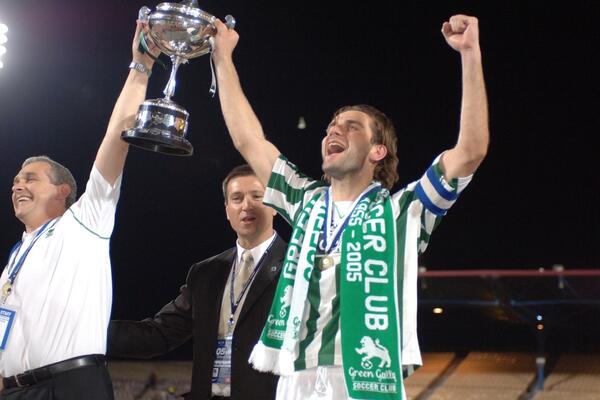
Oakleigh Cannons had a superb home-and-away season in 2006 and finished 12 points clear on top of the ladder from Altona Magic but fell apart in the finals series. So it was South Melbourne and Altona Magic who won their way into the grand final, with South triumphing 1-0, the winner scored by Gianni De Nittis in the 63rd minute. Fernando de Moraes had an outstanding season for the Blues, but the Gold Medal for the player of the year went to veteran striker Sash Becvinovski of Altona Magic.
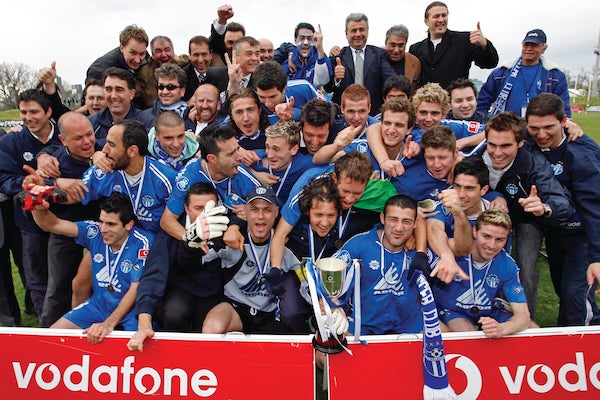
In 2007 Preston Lions defeated Whittlesea Zebras 3-1 in the grand final, with Zoran Petrevski scoring twice and winning the Rooney Medal. Preston won the preliminary final 2-1 against Melbourne Knights, after losing to Whittlesea in the major semi-final. Preston topped the ladder after the home-and-away games by a point from the Knights and the Zebras and two from Altona Magic in one of the most closely contested competitions in the history of the Premier League.
Altona Magic won the grand final against Melbourne Knights in 2008 after extra-time thanks to a last minute goal by Carl Recchia. The teams had been deadlocked and scoreless until then, reflecting the closeness of the competition. It had taken penalties to separate them in the major semi-final. Craig Elvin of the Knights won the Jimmy Rooney Medal. Green Gully had been on top of the ladder in the home-and-away season, by a point from the Knights, with the Magic in third place.
In 2009 Dandenong Thunder led the table at the end of the season by a massive 12 points from Altona Magic and Green Gully, but the finals series saw the Magic beat Dandenong in the major semi-final and the grand final. The final went to penalty kicks and Kliment Taseski scored the final goal for the title and won the Rooney Medal. That gave the Altona Magic back-to-back titles. The result also prevented Dandenong Thunder from emulating North Geelong in winning the Premier League in the first season after promotion to the top level.
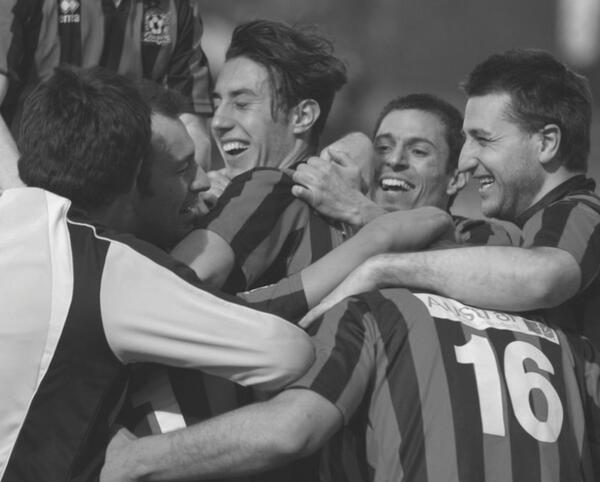
2010 was a fairytale season for Richmond, who claimed the minor premiership by a single point from Hume City who were deducted three competition points during the season. The Grand Final saw the minor premiers come up against the experience of Green Gully in the first ever final at AAMI Park. Gully proved too strong when it counted, scoring a resounding 3-0 win thanks to goals from Mathew Sanders, and former Richmond players Graham Hockless (Rooney medallist) and Steve Burton. South Melbourne's Brazilian Fernando de Moraes won the Gold Medal while Northcote City's Trent Rixon (19 goals) claimed the Golden Boot.
Green Gully claimed back-to-back championships yet again in 2011, doing the double in nail biting fashion with a 3-2 extra-time win over the Oakleigh Cannons. Gully's substitute Hamid Basma scored the final two goals of the match, the winner coming in the fifth minute of extra time. Steve Downes won the Rooney Medal, with Northcote City's Jason Trifiro winning the Gold Medal and Richie Cardozo scoring 19 goals for Hume City to claim the Golden Boot.
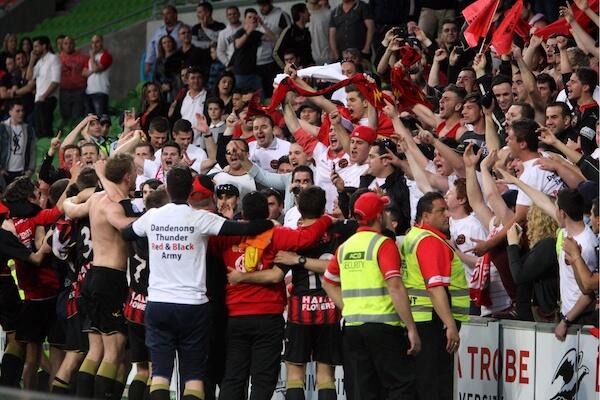
The final two seasons of the Premier League witnessed first-time champions. With Chris Taylor at the helm, Dandenong Thunder topped the table again in 2012, but this time powered on to win the Grand Final, defeating Oakleigh Cannons 2-1 in the final, thanks to goals from Luke Sherbon (the Golden Boot winner) and Nate Foster, who won the Jimmy Rooney Medal. Hume City's Nick Hegarty won the Gold Medal.
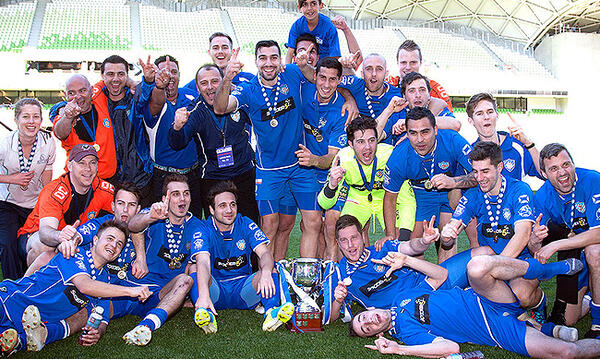
Former Socceroo Goran Lozanovski claimed his second championship, this time guiding Northcote City to glory in 2013. After winning the Minor Premiership by seven points, City were surprised 2-1 in extra time by Bentleigh Greens in the major semi-final at SS Anderson Reserve. Bouncing back to trounce South Melbourne 5-0 in the Preliminary Final, they took on the Greens again in the Grand Final at AAMI Park. With two minutes to play, City looked to have exacted revenge on their cross-town rivals, only to have Ryan De Vries score an equaliser. In extra time, Luke Sherbon put the Greens up after three minutes, but City's resilience guided them to their maiden Championship thanks to goals from Golden Boot winner Milos Lujic and the evergreen veteran Marino Gasparis.
